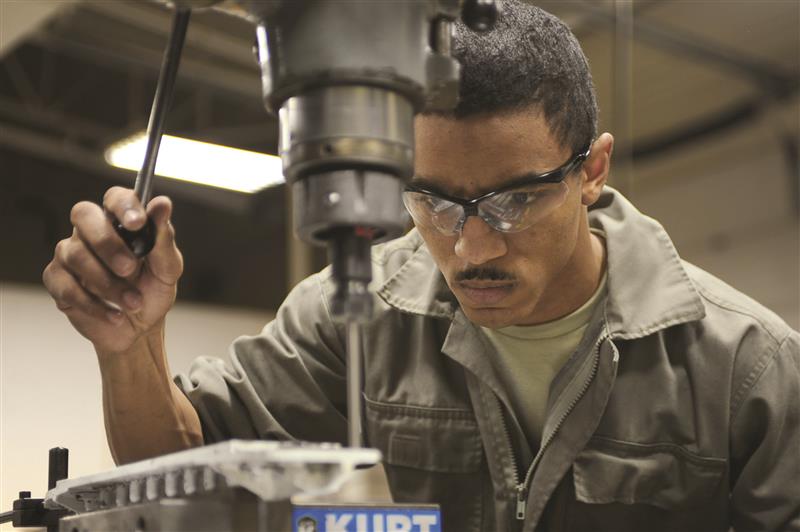5 Things You Didn’t Know About Skilled Trade Jobs
Published on May 5, 2022 in Labor




The pandemic has caused many to rethink their career goals and future priorities, and students are no exception.
The number of high schoolers considering a 4-year education dropped 71 percent since the start of the pandemic, with only 48 percent considering college, according to a recent survey from the ECMC group.
In lieu of traditional college degree paths, some students are opting to go directly into the workforce. For those interested in pursuing hands-on careers, skilled trades —ranging from plumbing and bricklaying to cooking and mechanics — are an attractive option.
“Online learning, coupled with other restrictions, has made office work less appealing for a lot of students,” said Tanise Hill, labor liaison at United Way for Southeastern Michigan. “One thing about skilled trades is that once you learn a skill, no one can ever take that away from you. You can get paid for that skill for the rest of your life.”
United Way for Southeastern Michigan’s labor and education teams worked together to help parents learn more about these lucrative and rewarding career paths for their students during our recent Parent Community of Practice (CoP) meeting. The CoP is a space for parents and caregivers to provide resources and opportunities to better support their children academically and personally.
“The CoP was created to help families navigate the landscape of a rapidly changing global society,” said DeAndrea Rogers, parent and family engagement director at United Way for Southeastern Michigan. “We know it’s critical for parents to have a safe space to discuss important topics, so we bring in guest speakers and experts to facilitate those conversations. Our goal is for parents to leave the CoP feeling empowered and refreshed.”
The recent virtual meeting featured informative breakout sessions and talks from individuals from a range of backgrounds and experiences in skilled trades. The overarching consensus of the group was that there are a lot of things people don’t know or misunderstand about the various industries and skilled trade jobs. With more information, parents can have more informed conversations with their children and help guide them along their career path.
Below, we’ve outlined our top five revelations from the enlightening conversation.
It’s a journey
Several journeymen – workers in a given trade or craft who successfully completed an official apprenticeship qualification – joined the conversation to share their personal experiences and answer any questions parents had about skilled-trade jobs.
Marc Little, an HVAC technician with the Utility Workers of America, Local 223, spoke about his path to an HVAC career.
“I started out working on cars and then I took a job on the line at GM. It was good money, but I didn’t like being inside all day,” Marc said. “I enrolled at the Detroit engineering institute and realized HVAC was for me. Thirty-four years later, I’m still at it.”
Marc and others were attracted to the freedom that comes with being a journeyman.
“With the skills you have, you can go anywhere you want to and work – across the country, overseas, anywhere in the world – people will always need buildings. They’ll always need to be kept warm or kept cool.”
Dressing the part is still important
During the event, DeAndrea shared tips on getting and keeping a job in the skilled trades. Although many of the jobs in these areas will allow casual attire or uniforms once your student is employed, it’s important that they adopt a more formal style for the interview, even if it’s virtual. She suggested collared shirts and dress pants instead of T-shirts and denim.
Networking with people in the field of interest is also critical. “Sometimes it’s who you know,” DeAndrea said. “Attend events where you can learn about new opportunities, explore the different roles, and meet people who have been there before because they can often be a great resource throughout your career.”
Education is key
Jobs in the skilled trades do not require a four-year degree, but that’s no reason to slack on your homework, according to Marc. Most of these jobs will expect a high school diploma, and several of the speakers encouraged students to emphasize building math and English skills ahead of graduation.
“There are certain skills you need for life,” Marc said. “Math to help you on the job and with tracking your personal finances, and English so that you can better communicate with your customers and coworkers.”
In addition to apprenticeships, organizations like the International Union of Bricklayers & Allied Craftworkers offer 12-week introductory programs for students. Speakers cautioned against enrolling in “quick fix” programs that make promises of job placement outside of official union apprenticeship programs. The average length of an apprenticeship is three to four years and students get paid while learning and perfecting their craft.
Skilled trades go beyond building
Parents heard from two entrepreneurs in the beauty and restaurant industries, which aren’t typically top of mind when people think about skilled trades. Sandy Levine, owner of Chartreuse Kitchen & Cocktails and several other hotspots across metro Detroit, discussed the growing demand for restaurant employees and the rewards that come from the kitchen. “I’ve made dozens to hundreds of close friends by working in restaurants,” he said. “I love the family aspect that comes from working as a team to provide a great customer experience.”
Marlene Brooks, CEO of Beauty Institute Wholesaler, started off as a beautician making “a couple hundred dollars a week,” and now, as the owner of a beauty school where she trains the next generation of stylists, she is on the path to making millions. The school boasts a 98 percent job placement rate with more than 70 percent of graduates eventually going on to pursue entrepreneurship.
Both Marlene and Sandy work with local schools to build interest in their respective industries.
Women are in demand
Felicia Wiseman, an electrician, instructor and organizer for the International Brotherhood of Electrical Workers (IBEW), shared a video featuring several female electricians discussing their experiences and debunking common myths that hold women back from pursing trade jobs.
“It’s worth the risk,” said Yony Williams, an apprentice with IBEW Local 58. “It’s worth at least trying because you learn so much about the trade and about yourself. All the things you thought you couldn’t do, or things people said you couldn’t do because you’re a woman – the field shows you, yes, you can.”
Felicia, who began her career pursuit as a single mother, defied the people who said it couldn’t be done. “Use your village to help you through any early hurdles,” she said. “Once you get your license, the possibilities are limitless. I tell everyone the trades are a good way to make a living and a good way to make a life.”
You can access the full video recap and receive invites to future meetings and events by signing up for our Parent Community of Practice.